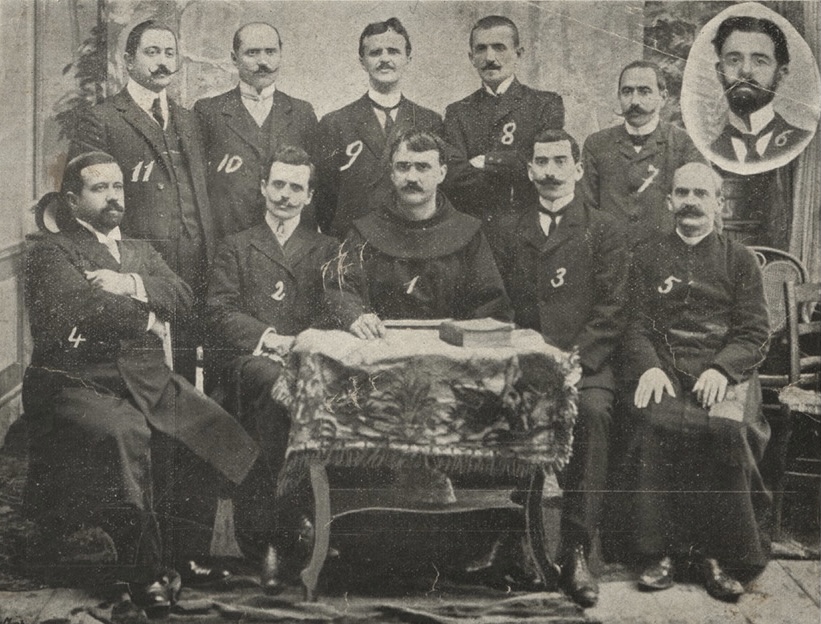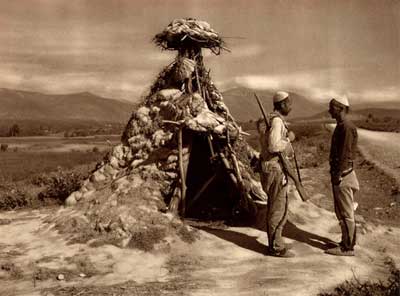|
Albanian Nationalism In North Macedonia
Albanian nationalism in North Macedonia traces its roots in the wider Albanian nationalist movement which emerged as a response to the Eastern Crisis (1878) and proposed partitioning of Ottoman Albanian inhabited lands in the Balkans among neighbouring countries.. During the remainder of the late Ottoman period various disagreements culminated between Albanian nationalists and the Ottoman Empire over socio-cultural rights. The Balkan Wars (1912–13) ending with Ottoman defeat, Serbian and later Yugoslav sovereignty over the area generated an Albanian nationalism that has become distinct to North Macedonia stressing Albanian language, culture and identity within the context of state and sociopolitical rights. Pan-Albanian sentiments are also present and historically have been achieved only once when western Macedonia was united by Italian Axis forces to their protectorate of Albania during the Second World War. Reincorporated within Yugoslavia, Albanian nationalism in North Maced ... [...More Info...] [...Related Items...] OR: [Wikipedia] [Google] [Baidu] |
Anatolia
Anatolia, tr, Anadolu Yarımadası), and the Anatolian plateau, also known as Asia Minor, is a large peninsula in Western Asia and the westernmost protrusion of the Asian continent. It constitutes the major part of modern-day Turkey. The region is bounded by the Turkish Straits to the northwest, the Black Sea to the north, the Armenian Highlands to the east, the Mediterranean Sea to the south, and the Aegean Sea to the west. The Sea of Marmara forms a connection between the Black and Aegean seas through the Bosporus and Dardanelles straits and separates Anatolia from Thrace on the Balkan peninsula of Southeast Europe. The eastern border of Anatolia has been held to be a line between the Gulf of Alexandretta and the Black Sea, bounded by the Armenian Highlands to the east and Mesopotamia to the southeast. By this definition Anatolia comprises approximately the western two-thirds of the Asian part of Turkey. Today, Anatolia is sometimes considered to be synonymous with Asian ... [...More Info...] [...Related Items...] OR: [Wikipedia] [Google] [Baidu] |
Xhem Hasa
Xhemail Hasani (1908 – 6 May 1945), known as Xhem Hasa and Xhem Gostivari, was an Albanian nationalist and Axis collaborator, in charge of the Balli Kombëtar's activities in the western regions of Yugoslav Macedonia, a part of Yugoslavia occupied by Fascist Italy and Nazi Germany during World War II. Early life Xhem Hasa was born in the village of Simnica near Gostivar, and grew up in a poor family with many children. During his childhood, up until his early stages of adulthood, Xhem worked as a farmer on his family's farm. The Hasa family experienced first-hand cruelty by the Yugoslav authorities, in particular the gendarmerie, who abused the local population. Exile in Albania Hasa murdered the head of the gendarmerie in Gostivar, who had abused the local Albanians, and fled through Mount Korab to Albania where he sought asylum in 1936. He lived on the outskirts of Elbasan, where he was soon joined by two of his brothers, Musli and Abdullah, and their families. Despite es ... [...More Info...] [...Related Items...] OR: [Wikipedia] [Google] [Baidu] |
Balli Kombëtar
The Balli Kombëtar (literally ''National Front''), known as Balli, was an Albanian nationalist, collaborationist and anti-communist resistance movement during the Second World War. It was led by Ali Këlcyra and by Midhat Frashëri. The movement was formed by members from the landowning elite, liberal nationalists opposed to communism and other sectors of society in Albania.... The motto of the Balli Kombëtar was: "'" (Albania for the Albanians, Death to the Traitors). Eventually the Balli Kombëtar joined the Nazi established puppet government and fought as an ally against communist guerrilla groups. The Balli Kombëtar engaged in significant acts of terror culminating in atrocities committed against Serb and Greek civilians. History Although Këlcyra and Frashëri had initiated opposition actions against the Italian authorities almost from the beginning of the fascist occupation in 1939, they had practically not developed any military organization for open struggle agains ... [...More Info...] [...Related Items...] OR: [Wikipedia] [Google] [Baidu] |
Greater Albania
Greater Albania is an irredentist and nationalist concept that seeks to unify the lands that many Albanians consider to form their national homeland. It is based on claims on the present-day or historical presence of Albanian populations in those areas. In addition to the existing Albania, the term incorporates claims to regions in the neighbouring states, the areas include Kosovo, the Preševo Valley of Serbia, territories in southern Montenegro, northwestern Greece (the Greek regional units of Thesprotia and Preveza, referred by Albanians as Chameria, and other territories that were part of the Vilayet of Yanina during the Ottoman Empire),. and a western part of North Macedonia. The unification of an even larger area into a single territory under Albanian authority had been theoretically conceived by the League of Prizren, an organization of the 19th century whose goal was to unify the Albanian inhabited lands (and other regions, mostly from the regions of Macedonia and Epir ... [...More Info...] [...Related Items...] OR: [Wikipedia] [Google] [Baidu] |
Kachaks
Kachaks ( sq, kaçak, sr, качаци / ''kačaci'') is a term used for the Albanian bandits active in the late 19th and early 20th century in northern Albania, Montenegro, Kosovo and Macedonia, and later as a term for the militias of Albanian revolutionary organizations against the Kingdom of Serbia (1910–18) Kingdom of Yugoslavia (1918–24), called the "Kaçak movement". Etymology The word is derived from Turkish '' kaçmak'' for "outlaw". Background History 1920–24 Kachak movement The Committee for the National Defense of Kosovo () was created in Shkodër, under Hasan Prishtina, in 1918. The committee organizationally and financially supported the kachaks in Albanian-populated areas of Yugoslavia, in Kosovo and Skopje (the former Kosovo Vilayet). Kachaks were also active around Ohrid and Bitola. On 6 May 1919 the Committee called for a general uprising in Kosovo and other Albanian-inhabited regions in Yugoslavia. The Kachaks were popular among Albanians, and local s ... [...More Info...] [...Related Items...] OR: [Wikipedia] [Google] [Baidu] |
Kingdom Of Yugoslavia
The Kingdom of Yugoslavia ( sh-Latn-Cyrl, separator=" / ", Kraljevina Jugoslavija, Краљевина Југославија; sl, Kraljevina Jugoslavija) was a state in Southeast Europe, Southeast and Central Europe that existed from 1918 until 1941. From 1918 to 1929, it was officially called the Kingdom of Serbs, Croats and Slovenes ( sh-Latn-Cyrl, separator=" / ", Kraljevina Srba, Hrvata i Slovenaca, Краљевина Срба, Хрвата и Словенаца; sl, Kraljevina Srbov, Hrvatov in Slovencev), but the term "Yugoslavia" (literally "Land of South Slavs") was its colloquial name due to its origins."Kraljevina Jugoslavija! Novi naziv naše države. No, mi smo itak med seboj vedno dejali Jugoslavija, četudi je bilo na vseh uradnih listih Kraljevina Srbov, Hrvatov in Slovencev. In tudi drugi narodi, kakor Nemci in Francozi, so pisali že prej v svojih listih mnogo o Jugoslaviji. 3. oktobra, ko je kralj Aleksander podpisal "Zakon o nazivu in razdelitvi kraljevine n ... [...More Info...] [...Related Items...] OR: [Wikipedia] [Google] [Baidu] |
First World War
World War I (28 July 1914 11 November 1918), often abbreviated as WWI, was one of the deadliest global conflicts in history. Belligerents included much of Europe, the Russian Empire, the United States, and the Ottoman Empire, with fighting occurring throughout Europe, the Middle East, Africa, the Pacific, and parts of Asia. An estimated 9 million soldiers were killed in combat, plus another 23 million wounded, while 5 million civilians died as a result of military action, hunger, and disease. Millions more died in genocides within the Ottoman Empire and in the 1918 influenza pandemic, which was exacerbated by the movement of combatants during the war. Prior to 1914, the European great powers were divided between the Triple Entente (comprising France, Russia, and Britain) and the Triple Alliance (containing Germany, Austria-Hungary, and Italy). Tensions in the Balkans came to a head on 28 June 1914, following the assassination of Archduke Franz Ferdina ... [...More Info...] [...Related Items...] OR: [Wikipedia] [Google] [Baidu] |
Kingdom Of Serbia
The Kingdom of Serbia ( sr-cyr, Краљевина Србија, Kraljevina Srbija) was a country located in the Balkans which was created when the ruler of the Principality of Serbia, Milan I, was proclaimed king in 1882. Since 1817, the Principality was ruled by the Obrenović dynasty (replaced by the Karađorđević dynasty for a short time). The Principality, under the suzerainty of the Ottoman Empire, ''de facto'' achieved full independence when the last Ottoman troops left Belgrade in 1867. The Congress of Berlin in 1878 recognized the formal independence of the Principality of Serbia, and in its composition Nišava, Pirot, Toplica and Vranje districts entered the South part of Serbia. In 1882, Serbia was elevated to the status of a kingdom, maintaining a foreign policy friendly to Austria-Hungary. Between 1912 and 1913, Serbia greatly enlarged its territory through engagement in the First and Second Balkan Wars— Sandžak-Raška, Kosovo Vilayet and Vardar Macedonia ... [...More Info...] [...Related Items...] OR: [Wikipedia] [Google] [Baidu] |
Debar
Debar ( mk, Дебaр ; Albanian: ''Dibër''/''Dibra'' or ''Dibra e Madhe;'' ) is a city in the western part of North Macedonia, near the border with Albania, off the road from Struga to Gostivar. It is the seat of Debar Municipality. Debar has an ethnic Albanian majority of 74% and is North Macedonia's only city in which ethnic Macedonians do not rank first or second demographically. The official languages are Macedonian and Albanian. Name The name of the city in Macedonian is ''Debar'' (Дебар). In Albanian; ''Dibër''/''Dibra'' or ''Dibra e Madhe'' (meaning "Great Dibra", in contrast to the other Dibër in Albania). In Serbian ''Debar'' (), in Bulgarian ''Debǎr'' (), in Turkish ''Debre'' or ''Debre-i Bala'', in Greek, ''Dívrē'' () or ''Dívra'' (), in Ancient Greek ''Dèvoros'', Δήβορος and in Roman times as ''Deborus''. Geography Debar is surrounded by the Dešat, Stogovo, Jablanica and Bistra mountains. It is located 625 meters above sea level, next to ... [...More Info...] [...Related Items...] OR: [Wikipedia] [Google] [Baidu] |





